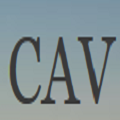A new federated learning (FL) framework enabled by large-scale wireless connectivity is proposed for designing the autonomous controller of connected and autonomous vehicles (CAVs). In this framework, the learning models used by the controllers are collaboratively trained among a group of CAVs. To capture the varying CAV participation in the FL training process and the diverse local data quality among CAVs, a novel dynamic federated proximal (DFP) algorithm is proposed that accounts for the mobility of CAVs, the wireless fading channels, as well as the unbalanced and nonindependent and identically distributed data across CAVs. A rigorous convergence analysis is performed for the proposed algorithm to identify how fast the CAVs converge to using the optimal autonomous controller. In particular, the impacts of varying CAV participation in the FL process and diverse CAV data quality on the convergence of the proposed DFP algorithm are explicitly analyzed. Leveraging this analysis, an incentive mechanism based on contract theory is designed to improve the FL convergence speed. Simulation results using real vehicular data traces show that the proposed DFP-based controller can accurately track the target CAV speed over time and under different traffic scenarios. Moreover, the results show that the proposed DFP algorithm has a much faster convergence compared to popular FL algorithms such as federated averaging (FedAvg) and federated proximal (FedProx). The results also validate the feasibility of the contract-theoretic incentive mechanism and show that the proposed mechanism can improve the convergence speed of the DFP algorithm by 40% compared to the baselines.
翻译:为设计连接和自主车辆(CAVs)的自动控制器,提议了一个由大规模无线连接促成的新的联盟学习框架。在这个框架内,控制器使用的学习模式是在一批CAV中合作训练的。为了捕捉不同CAV参与FL培训过程和不同CAV数据质量在CAV中的不同影响,明确分析了不同CAV参与FL进程和不同CAV数据质量对拟议DFP算法趋同的影响。除了这一分析外,还提出了一个基于合同理论的激励机制,以提高FL趋同速度、无线淡化通道、以及所有CAVA的不平衡和非独立及同样分布的数据。对拟议的CAVA的趋同速度进行了严格的趋同分析,以确定CAVA公司与使用最佳自主控制器的趋同速度。 拟议的CAVAV公司与FAFA的趋同速度也能够准确地跟踪CAVAFA的升级速度。


